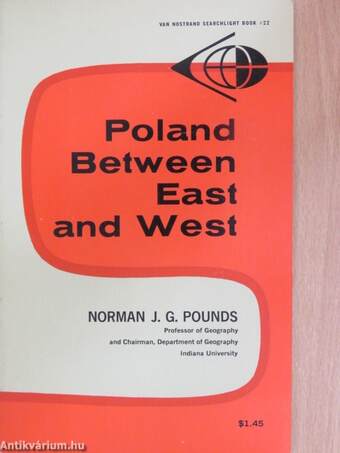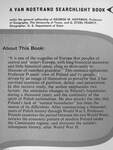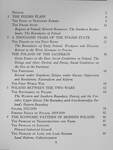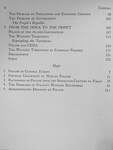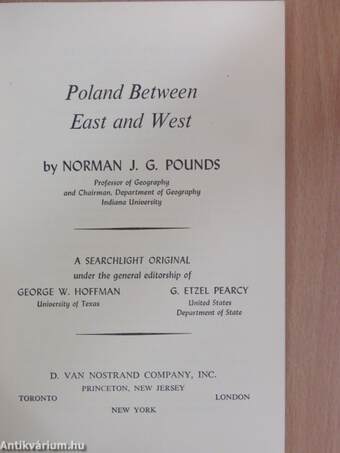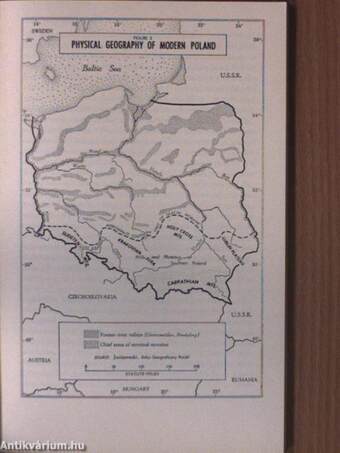1.060.331
kiadvánnyal nyújtjuk Magyarország legnagyobb antikvár könyv-kínálatát

VISSZA
A TETEJÉRE
JAVASLATOKÉszre-
vételek
Poland Between East and West
| Kiadó: | D. van Nostrand Company, Inc. |
|---|---|
| Kiadás helye: | Toronto |
| Kiadás éve: | |
| Kötés típusa: | Ragasztott papírkötés |
| Oldalszám: | 132 oldal |
| Sorozatcím: | Van Nostrand Searchlight Book |
| Kötetszám: | 22 |
| Nyelv: | Angol |
| Méret: | 20 cm x 13 cm |
| ISBN: | |
| Megjegyzés: | Néhány fekete-fehér térképpel. |
naponta értesítjük a beérkező friss
kiadványokról
naponta értesítjük a beérkező friss
kiadványokról
Fülszöveg
A VAN NOSTRAND SEARCHLIGHT BOOK
under the general editorship of GEORGE W. HOFFMAN, Professor
of Geography, The University of Texas, and G. ETZEL PEARCY,
Geographer, U. S. Department of State
About This Book:
"It is one of the tragedies of Europe that peoples of
central and eastern Europe, with long historical memories
and little historical sense, cling so obstinately to. . .
illusions of vanished grandeur." This sentence epitomizes
Professor Pounds' view of Poland and its people,
driven by an image of themselves so powerful that it has
survived centuries of partition, defeat, and persecution.
In this incisive study, the author emphasizes two
factors: the enormous changes in Poland's boundaries
during a thousand years; and the continuity of the
spirit of Polish nationalism. He also attacks the idea that
Poland's lack of "natural boundaries" has been the
source of its difficulties. After summarizing a thousand
years of Polish history through World War I, Professor... Tovább
Fülszöveg
A VAN NOSTRAND SEARCHLIGHT BOOK
under the general editorship of GEORGE W. HOFFMAN, Professor
of Geography, The University of Texas, and G. ETZEL PEARCY,
Geographer, U. S. Department of State
About This Book:
"It is one of the tragedies of Europe that peoples of
central and eastern Europe, with long historical memories
and little historical sense, cling so obstinately to. . .
illusions of vanished grandeur." This sentence epitomizes
Professor Pounds' view of Poland and its people,
driven by an image of themselves so powerful that it has
survived centuries of partition, defeat, and persecution.
In this incisive study, the author emphasizes two
factors: the enormous changes in Poland's boundaries
during a thousand years; and the continuity of the
spirit of Polish nationalism. He also attacks the idea that
Poland's lack of "natural boundaries" has been the
source of its difficulties. After summarizing a thousand
years of Polish history through World War I, Professor
Pounds examines the period between the two World Wars;
reviews the economic pattern of modern Poland under
the Communist regime; and discusses the nation's
subsequent history, after World War II. Vissza
Témakörök
- Történelem > Társadalomelmélet
- Idegennyelv > Idegennyelvű könyvek > Angol > Természettudományok > Földrajz
- Idegennyelv > Idegennyelvű könyvek > Angol > Történelem > Európa története > Egyéb
- Természettudomány > Földrajz > Általános gazdasági földrajz > Egyéb
- Természettudomány > Földrajz > Kontinensek földrajza > Topográfia szerint > Európa
- Természettudomány > Földrajz > Idegen nyelv > Angol
- Történelem > Idegennyelvű > Angol
- Történelem > Egyéb
- Történelem > Politika > Politológia
- Történelem > Tanulmányok
- Történelem > Kontinensek szerint > Európa, európai országok története > Közép-Európa > Egyéb



